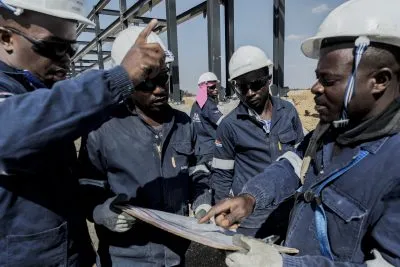The whole history of regional integration in Africa has been an effort by its leaders to mitigate the negative externalities of the continent’s irrational borders. With a third of the population living in landlocked countries and a legacy of north-south colonial infrastructure, the continental integration project has been largely arranged and designed around economics.
However, one could argue that the same justifications for economic integration carry over into collective action on regional security. President Paul Kagame of Rwanda stressed this in remarks at the last Africa Air Chiefs Symposium, noting “Security and prosperity are two sides of the same coin. You cannot have one without the other.”
In 1991, in response to a seemingly intractable civil war and ethnic bloodletting, Liberia’s West African neighbours intervened by sending a military force to oversee a ceasefire and bring the parties together for a negotiated political settlement. Beyond this, however, West African leaders sought to limit the spread of insecurity across the sub-region. They reasoned, correctly, that the contagion of insecurity in Liberia could spread across the Mano River Union’s porous borders, inspire copycats, and lead to greater instability.
A much greater threat menaces the sub-region today and necessitates a similar collective response. What began in 2012 as a localised insurgency in northern Mali now carries the grave risk of destabilising the entire region as the contagion spreads from Mali, infecting Burkina Faso, Chad, and Niger. A second tier of countries – Benin, Côte d’Ivoire, Ghana and Togo – are now in the crosshairs of this threat.
The cost of insecurity, in lives and livelihoods, on this scale is frightening. It certainly justifies the need for a permanent arrangement on collective security to monitor emergent security threats and ensure rapid responses. As the region embarks on a deepening of economic ties through greater integration, freer movement of people, and attempting to attract investment in infrastructure, widespread violence and insecurity will stall and possibly abort any progress.
Need for political solutions
Any sustainable West African response to the creeping instability – Islamist insurgencies, mutinies, and coups d’état (using the instability as an excuse) must be anchored in a political process. It is important to underscore that most security problems emerging in the sub-region are political in origin and the inevitable outcome of decades-long governance failures.
Even the 2012 insurgency in northern Mali began as a political conflict that was ultimately hijacked by Islamist forces. Governments that are unable or unwilling to protect their citizens as armed insurgents and bandits prey on them, ultimately lose legitimacy. When whole regions or segments of the population feel ignored by the state and their lived experience occurs outside the remit of the state – no infrastructure, no social services and inadequate representation in the political process – it provides excuses to mutineers, coup plotters and leaders of insurgencies.
Affected communities, either as a means of survival or acquiescence with the violent cause, take up arms against the state. Governments perceived as incompetent, absentee and corrupt ultimately preside over an erosion of public faith in them. An Ecowas that is conspicuously silent in the face of widespread corruption, rights abuses and public neglect, but suddenly rushes to action in response to coups d’état and violent protests, will be perceived as acting against the interest of the average citizen.
Limits of political solutions
But political settlements have their limits. There are actors whose grievances and demands have no true legitimacy in the political process. These are actors for whom weaknesses in governance are simply pretexts for chaos. Their goals cannot be accommodated within the political process, without undoing the very foundation of the state: mutineers overthrowing elected civilian governments, regions seeking secession or ethnic enclaves in a multi-ethnic society, and jihadists advancing the introduction of religious laws nationally in multireligious societies.
In pursuit of these maximalist goals, these actors disrupt the peace with wanton violence – suicide bombings, targeted assassinations and widespread human rights abuses and killings. In 2021 alone, jihadists killed more than 1,300 civilians in Mali, Niger and Burkina Faso, bringing the toll since 2015 to more than 3,500 according to the Armed Conflict Location & Event Data Project.
In response to such actors and groups, Ecowas needs to dedicate resources to a permanent security arrangement with a mandate beyond peacekeeping. There is need for regional intelligence gathering and sharing – training, deploying and providing resources for an expansive human intelligence network. The vast expanse over which these groups operate makes it impossible for any one of the resource-strapped Sahelian states to field an army to patrol it or an intelligence network to gather information.
Raising and deploying an army that size would have the perverse effect of worsening the conditions that precipitated the crisis in the first place – it would inevitably divert resources away from providing infrastructure and social services to support the war effort. We cannot also be content with outsourcing sub-regional security to France and somehow decry French influence as “neo-colonial”.
Interventions must be regionally led
An approach that sees the threat as Nigerien, Mauritanian or Burkinabe is borderline reckless. Just as Africa reaped the benefits of pooled resources in purchasing vaccines and materials in the fight against Covid-19, Ecowas can do the same against insecurity. As with the former peacekeeping interventions of the Ecowas Monitoring Group (Ecomog) in Liberia, Sierra Leone, Guinea-Bissau and Côte d’Ivoire, this must be Ecowas-led.
Operations like Barkhane and the G5 Sahel joint force, as useful as they are, have been led by external actors. The increasing anti-France rhetoric and sentiments in these countries make the end of Operation Barkhane an ever-increasing reality. Ecowas needs to look beyond these external efforts since none of these externally led initiatives is sustainable in the long run.
As the continent pushes forward on its economic integration project, it will have to take steps to secure and protect those gains from instability. The insecurity and political volatility spreading across West Africa pose a grave threat to the region’s collective prosperity. It is also beyond the capacity of any one state or a patchwork of efforts to address alone. The Ecomog precedent in Liberia presents a clear roadmap of how the region can pool its security resources and act in concert to degrade or fully excise the threat.
Gyude Moore is a senior policy fellow at the Center for Global Development.
Want to continue reading? Subscribe today.
You've read all your free articles for this month! Subscribe now to enjoy full access to our content.
Digital Monthly
£8.00 / month
Receive full unlimited access to our articles, opinions, podcasts and more.
Digital Yearly
£70.00 / year
Our best value offer - save £26 and gain access to all of our digital content for an entire year!
 Sign in with Google
Sign in with Google 



